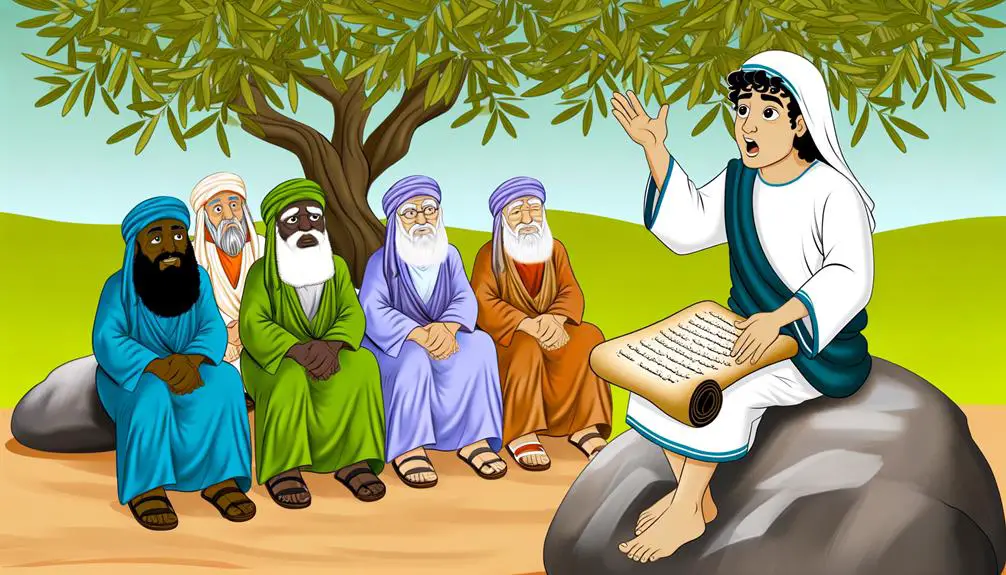Navigate the intriguing perspectives of Elihu in the Bible, where conventional views on suffering and divine justice are compellingly challenged.

Elihu in the Bible
In the Book of Job, you'll meet Elihu, son of Barachel the Buzite, who stands apart from Job's other friends by offering a nuanced critique of divine justice and suffering. Unlike his predecessors, Elihu doesn't adhere to conventional retributive justice theories; he suggests that suffering serves as divine pedagogy. His analysis utilizes sophisticated rhetorical methods, challenging both Job and the readers to rethink assertions about righteousness and divine intentions. His speeches serve as a bridge to God's direct response, importantly enriching the Joban discourse. Unearthing the layers in Elihu's arguments could further enrich your understanding of biblical narratives.
Key Takeaways
- Elihu is a biblical character introduced in the Book of Job, offering a unique perspective on divine justice and suffering.
- Unlike Job's other friends, Elihu emphasizes that suffering can be educative and corrective, not merely punitive.
- He is portrayed as younger and possibly less biased, challenging traditional views with fresh insights into God's teachings.
- Elihu's speeches serve as a narrative bridge, setting the stage for God's direct response to Job.
- His ideas on redemptive suffering and divine communication through nature have influenced theological discourse across centuries.
Who Is Elihu?

In the Book of Job, Elihu is a lesser-known figure whose speeches critically reinterpret the preceding dialogues between Job and his friends. Elihu's lineage is specified as the son of Barachel the Buzite, of the family of Ram, which situates him within a minor but identifiable tribal context. His background, though briefly mentioned, hints at a lineage that is not central to the narrative, yet his ancestry in the text establishes his legitimacy to speak among Job's more prominent friends.
Analyzing Elihu's character motivation reveals a complex interplay of youth and wisdom, humility, and boldness. Unlike Job's other friends, Elihu listens patiently before speaking, indicating a deliberative character who respects the discourse's established rhythms yet is motivated by a distinct sense of justice and truth. He believes that his insights, divinely inspired, are pivotal for Job to understand his suffering correctly. This motivation isn't just to correct Job but also to rectify the theological inaccuracies presented by the other friends. Elihu positions himself as a mediator between God and Job, driven by a zeal to clarify and defend the righteousness of God, which he perceives has been misrepresented.
Context of Elihu's Appearance
Elihu's entrance into the narrative occurs after Job's three friends have exhausted their arguments, presenting a pivotal moment where fresh perspectives are introduced to challenge prevailing interpretations. This shift in the Book of Job's narrative structure marks an intriguing development, setting the stage for a nuanced exploration of the themes of suffering and divine justice.
To fully appreciate the significance of Elihu's role at this juncture, consider the following aspects of the narrative context:
- Interruption of Silence: After rounds of dialogue, all parties fall silent, creating a dramatic pause filled by Elihu, emphasizing the impact of his subsequent discourse.
- Youthful Perspective: Unlike the older friends, Elihu's younger age introduces a new, potentially less biased viewpoint to the discourse, suggesting a shift away from traditional arguments.
- Challenge to Cultural Norms: Elihu does not hesitate to criticize both Job and his friends, indicating a break from the deference typically expected towards elders, reinvigorating the debate with critical questions about righteousness and suffering.
- Narrative Bridge: His speeches act as a bridge to God's direct response, enhancing the narrative flow and deepening the theological inquiry of the text.
Analysis of Elihu's Speeches

Having set the stage with Elihu's entry, let's now examine the content and implications of his speeches within the narrative. You'll find that his contributions aren't merely filler; they have deep speech significance, intertwining sophisticated rhetorical methods with profound theological insights. Elihu uses a didactic tone, which differs sharply from the preceding discourses. His method of engaging with Job and the friends is not just through direct rebuke or simplistic consolation, but through a layered approach that challenges the listener to think critically about divine justice and human suffering.
Elihu's speeches are meticulously structured, aiming to correct the theological inaccuracies presented by Job's friends and to refocus the discourse on a more nuanced understanding of God's ways. His use of rhetorical questions and analogies serves to provoke Job into reconsidering his assertions about his own righteousness and God's justice. This method not only elevates the intellectual rigor of the dialogue but also positions Elihu as a pivotal figure in shifting the narrative towards a more elevated theological reflection.
His speeches, hence, serve as an important bridge in the narrative development, shifting from human misunderstandings to a more profound divine revelation, all achieved through a carefully crafted rhetorical strategy.
Elihu's Understanding of Suffering
Exploring the depths of suffering, Elihu proposes that afflictions serve not merely as punishment but as divine pedagogy to restore righteousness and deepen one's reverence for God. Unlike traditional views that equate suffering solely with divine retribution, Elihu introduces a nuanced perspective that sees pain as a multifaceted tool used by God for greater spiritual and moral purposes. This deeper understanding of the purpose of suffering reveals a more compassionate and educational aspect of divine interaction.
To fully appreciate Elihu's insights, consider these key points:
- Educational Correction: Elihu suggests that God uses suffering to correct and guide individuals back to a path of righteousness, acting out of a desire to improve rather than merely to punish.
- Preventative Caution: He posits that pain can serve as a preemptive measure to prevent greater sin, thereby sparing individuals from more severe future consequences.
- Revelation of Character: Through suffering, one's true character and resilience are tested and revealed, fostering personal growth and deeper self-understanding.
- Invitation for Reflection: Elihu views afflictions as an opportunity for introspection, urging individuals to reflect on their actions and relationship with God.
Such an approach not only challenges the simplistic equation of suffering with punishment but also enriches our understanding of divine retribution and the broader purposes of suffering.
Differences From Job's Three Friends

In contrast to Job's three friends, who primarily view suffering as punishment for sin, Elihu introduces a more nuanced interpretation that emphasizes its instructional and corrective roles. As you explore this unique perspective, it's important to understand how Elihu's age and the friendship dynamics shape his distinct approach.
Elihu, being noticeably younger than the other three friends, brings a fresh lens to the discourse. His youth is not just a marker of time but signifies a paradigmatic shift in the interpretation of suffering. Unlike Eliphaz, Bildad, and Zophar, who often lean on traditional retributive justice theories, Elihu's arguments suggest that suffering serves as a divine pedagogy, aimed at refining moral and spiritual understanding rather than mere punishment.
The dynamics of friendship here also play a pivotal role. Initially, Elihu remains silent out of respect for his elders, adhering to the social norms of his time. However, his eventual decision to speak up marks a turning point, reflecting his belief in the necessity of voicing truth over maintaining status quo interpersonal comfort. His approach challenges the established wisdom, advocating for a view that considers suffering as a complex, multifaceted tool used by God for human betterment, distinct from the simplistic punitive measures discussed by his predecessors.
Elihu's View of God's Justice
Elihu's interpretation of divine justice diverges sharply from his predecessors' views, emphasizing God's role as a teacher rather than a strict punisher. He views sufferings not merely as divine retribution but as a means to educate and refine. This perspective shifts the traditional view of God as merely a dispenser of justice to a more nurturing and corrective role.
Here are four key aspects of Elihu's approach to divine justice:
- Educational Purpose: Elihu believes that God uses suffering to teach righteousness and wisdom, moving away from the notion of mere punishment.
- Moral Correction: He suggests that God's interventions are aimed at correcting wrongs and guiding humanity back to the right path, rather than serving as harsh penalties.
- Communication through Pain: Pain, in Elihu's view, is a form of divine communication, a tool used to capture attention and provoke reflection and moral realignment.
- Justice as Restoration: Elihu embodies the concept of Justice personification by presenting God's actions as efforts to restore balance and harmony, rather than exacting vengeance.
Elihu's nuanced view challenges you to rethink traditional notions of justice and divine interaction, highlighting the complexity of God's relationship with humanity.
Impact of Elihu's Contributions

Reflecting on these views, you might now appreciate how Elihu's innovative interpretation of divine justice greatly influenced theological discourse and spiritual understanding in biblical contexts. Elihu's contributions pivot around his discerning perspectives on suffering and the righteousness of God, which diverge markedly from earlier Joban dialogues. His assertions that God communicates through pain, as a form of divine pedagogy rather than mere punishment, brought a nuanced layer to theodicy that scholars still dissect today.
Elihu's influence extends beyond the immediate narrative; his ideas seeded discussions that bridge Old Testament theology and New Testament grace. By suggesting that suffering could be both corrective and instructive, Elihu introduces a precursor to the concept of redemptive suffering found in later Christian thought. This theological implication supports a more dynamic interaction between divine sovereignty and human experience, challenging static interpretations of God's will.
Moreover, Elihu emphasizes God's communicative nature through the environment, suggesting a broader, more integrated view of divine engagement with the world. These insights not only enriched the Joban framework but also offered a template for interpreting divine interaction in a broader scriptural context, enhancing both academic and lay spiritual interpretations. Therefore, his theological implications resonate through centuries, underscoring the depth and reach of his biblical impact.
Frequently Asked Questions
What Does the Name "Elihu" Mean in Hebrew?
Diving into the depths of name origins, 'Elihu' in Hebrew carries significant etymological weight, meaning "He is my God." This reflects a profound spiritual acknowledgment rooted in ancient linguistic traditions.
How Old Was Elihu When He Spoke to Job?
You're exploring the concept of youthful wisdom; yet, the exact age of Elihu when he addressed Job isn't specified in the texts, underscoring that age significance may be less pivotal than the wisdom imparted.
Is Elihu Mentioned in Any Other Religious Texts or Traditions?
You're exploring Elihu's influence in comparative mythology, yet he isn't prominently mentioned in other religious texts or traditions outside the Bible, making direct analytical comparisons somewhat limited in a broader scholarly context.
What Do Scholars Debate About Elihu's Role in the Book of Job?
Scholars debate Elihu's authenticity and the significance of his speeches, questioning whether they're original to the text or later additions, and analyze how they influence the overall theological and philosophical narrative of the work.
Does Elihu Appear in Any Artistic or Literary Works Outside the Bible?
Ironically, while you might not associate Elihu's influence widely, his character has inspired various artistic interpretations, enriching literature and art with nuanced portrayals that explore deeply into his complex role and philosophical implications.



Sign up